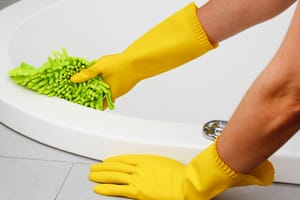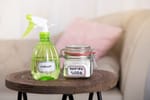Saving water is one of the simplest yet most impactful ways to contribute to a healthier planet.
By making small changes in our daily routines, we can protect this vital resource for future generations.
Whether it’s through simple habits or smart household upgrades, there are countless opportunities to reduce water waste.
Start today with these easy and effective tips to make a positive difference!
1)) Fix Leaks Promptly
Leaks may seem minor, but they can waste thousands of gallons of water annually if left unattended.
Whether it’s a dripping faucet, a running toilet, or a leaky pipe, these small issues can quickly add up to significant water loss.
Repairing leaks promptly not only saves water but also reduces your utility bills and prevents potential damage to your home.
By addressing leaks as soon as they’re noticed, you can play an important role in conserving water and maintaining a more efficient household.
2)) Install Water-Efficient Fixtures
Water-efficient fixtures are a simple yet powerful way to significantly reduce water usage in your home.
Devices such as low-flow showerheads, faucet aerators, faucets, and dual-flush toilets are designed to use less water while maintaining the same level of performance.
These upgrades are easy to install and can result in substantial savings on your water bill over time.
By choosing water-efficient fixtures, you can minimize waste and make your home both eco-friendly and cost-effective.
3)) Turn Off The Tap While Brushing Teeth
One of the easiest ways to save water is to turn off the tap while brushing your teeth.
Leaving the faucet running for two minutes can waste up to four gallons of water each time you brush.
Simply wetting your toothbrush at the start and using the tap only to rinse can drastically cut down on unnecessary water usage.
This small habit requires minimal effort yet makes a meaningful impact on conserving water in your daily routine.
By adopting this simple practice, you contribute to preserving this precious resource and setting a great example for others in your household.
4)) Collect Rainwater For Outdoor Use
Collecting rainwater for outdoor use is an excellent way to make the most of a natural resource while reducing your household’s water consumption.
By setting up rain barrels or storage containers to capture runoff from your roof, you gain a free and sustainable water source for tasks like watering plants, washing outdoor surfaces, or even filling birdbaths.
This method not only lowers your reliance on municipal water supplies but also helps manage stormwater runoff, preventing excess water from overwhelming local drainage systems.
Making use of rainwater is a simple yet effective step toward conserving water and promoting environmental sustainability.
5)) Use A Dishwasher Instead Of Handwashing
Modern dishwashers are designed to use significantly less water than handwashing dishes, provided they are run with a full load.
While washing dishes by hand may seem like the more conservative choice, it can consume up to four times more water than using an energy-efficient dishwasher.
By ensuring you scrape food off plates and load your dishwasher to capacity, you maximize its efficiency and minimize water waste.
Choosing a dishwasher over handwashing is a smart way to save water, energy, and time while keeping your kitchen clean and sustainable.
6)) Water Plants Early In The Morning Or Late At Night
Watering plants early in the morning or late at night is an effective way to conserve water and keep your garden healthy.
During these cooler times of the day, less water is lost to evaporation, ensuring that more moisture reaches the roots where it’s needed most.
This practice not only reduces water wastage but also encourages deeper root growth, resulting in stronger, more resilient plants.
By making this small adjustment to your watering routine, you can save water, support thriving greenery, and maintain a more sustainable outdoor space.
7)) Use A Broom Instead Of A Hose To Clean Driveways
Using a broom instead of a hose to clean driveways is a simple yet effective way to conserve water.
Spraying down driveways with a hose can waste hundreds of gallons of water, especially when used for routine cleaning tasks.
A sturdy broom, on the other hand, can easily remove dirt, leaves, and debris without using any water at all.
This method not only preserves water but also reduces runoff, which can carry harmful pollutants into local waterways.
By opting for a broom to clean your driveway, you save water, protect the environment, and adopt a more sustainable cleaning habit.
8)) Take Shorter Showers
Taking shorter showers is a straightforward and impactful way to cut back on water usage in your home.
Even reducing your shower time by just a couple of minutes can save gallons of water each day, making a significant difference over time.
Installing a timer or listening to a short playlist while showering can help you stay mindful of your water usage without sacrificing comfort.
By committing to shorter showers, you save water, reduce your utility bills, and contribute to more sustainable water consumption in your daily life.
9)) Reuse Household Water For Cleaning Or Gardening
Reusing household water for cleaning or gardening is an innovative and eco-friendly way to conserve water.
Graywater from activities like rinsing fruits and vegetables, collecting leftover water from boiling pasta, or even using leftover water from pet bowls can be repurposed for tasks such as mopping floors or watering plants.
This practice significantly reduces water wastage by giving used water a second life while reducing your reliance on freshwater supplies.
By incorporating this habit into your routine, you save water, lower your environmental impact, and create a more sustainable household.
10)) Run Full Loads In Washing Machines And Dishwashers
Running full loads in washing machines and dishwashers is one of the easiest ways to conserve water and energy in your household.
These appliances are designed to use a set amount of water and energy per cycle, regardless of how many items are inside.
By waiting until you have a full load before running them, you maximize their efficiency and reduce the number of cycles needed overall.
This simple practice not only minimizes water and energy waste but also extends the lifespan of your appliances by reducing wear and tear.
Making full loads part of your routine helps you save resources, lower utility bills, and live more sustainably.
Conclusion
Adopting water-saving habits in our daily routines is a simple yet powerful way to contribute to environmental sustainability.
By making mindful choices like using energy-efficient appliances, watering plants at optimal times, and reusing household water, we not only conserve precious resources but also reduce our overall environmental impact.
These small adjustments collectively make a big difference, helping protect our planet for future generations while creating more efficient and sustainable households today.
Every drop counts, and through these practical steps, we can all play a part in preserving the earth's water supply.
Download Our Free E-book!








